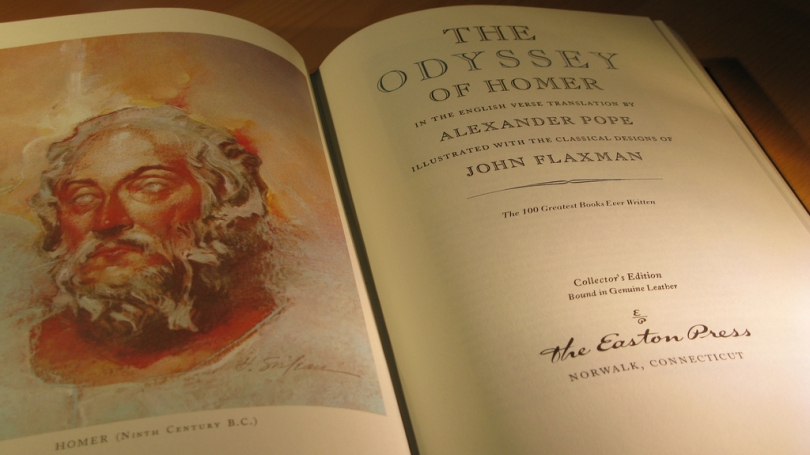War Stories: Modern Vets Meet Ancient Texts

When Classics Professor Roberta Stewart began reading war stories with veterans, it was less a professional undertaking than a passion project she’d dreamt up during a reflective moment in her career. She had been teaching Latin, Greek, and ancient history at Dartmouth for 18 years when she decided in 2008 to embark on what she has since called “some of the most important work that I do.” She began by inviting local veterans to join her in reading one of two works by Homer,The Odyssey or The Iliad, over the course of fourteen weeks at Hanover’s Howe Library. Discussions there drew parallels between what Homer understood about war and homecoming in ancient times, and what soldiers experience today.
Building on the success of this program, and on her academic course offerings which illuminate many of these same parallels, Stewart designed a new academic course recently on the topic of war stories more broadly. Wrapping up its first run in spring 2017, the course invites students to consider the experiences of war through the lens of a wide range of literary witnesses, from Homer and Vergil to more modern writers, such as Tim O’Brien and E. Maria Remarque.
Along with Stewart, shepherding students through the complexity of these texts and the experiences they portray are Learning Fellows Jonathan Kong and Jason Laackmann. Like all Learning Fellows, Kong and Laackmann provide in-class facilitation for discussions and group work, helping students to unpack and understand the content of the course. But unlike other Learning Fellows, they have not experienced the course previously for themselves. Instead, they bring their lived experiences as war veterans to bear.
“The emphasis is on students developing their own ideas,” says Kong. “Once they have gotten it all out there, we can share our perspectives based on our experience.” Significantly, the perspectives and experiences Kong and Laackmann bring to the discussion are often wildly divergent, a fact they feel has learning value for the students. “It forces them to recognize that every veteran’s experience is different, and there is no right answer” says Kong.
Stewart notes the benefit this provides in helping the course to reach one of its intended outcomes. “We want students to recognize that all narratives are constructs, situated historically, so they need to think and judge carefully. If students come away with that self awareness and reflectiveness, we’ve done our job,” she says.
For Kong, the narratives that exist about the soldier’s experience have not often been accurate or helpful, so when he heard about the opportunity to be involved in the course, he hesitated. “I thought it would be just another exploitation of vets,” he says. “A dog and pony show of their struggles, and how broken we are.”
He explains that the narrative of combat soldiers is written and told by the veteran majority, only 10% of whom actually experienced combat. But after meeting with Stewart, he was reassured. “She gets it,” he says. “She’s open about the fact that she’s still learning, and she has a knack for being reflective.”
Stewart’s course design seamlessly weaves history with contemporary experiences by incorporating poetry, short story, documentary, blogging, and graphic novels, alongside Homer’s ancient tomes. “Artists are acute social observers,” Stewart says, “So we’re looking to the art of each era to understand the persistent social problems of war and homecoming.”
Kong, for one, has been surprised at the relevance of the ancient texts. He muses, “Nothing has changed in the war experience. 2400 years ago, these themes existed: war as its own topic, homecoming as another.” Homer’s Iliad spans 24 books about the experience of war, and The Odyssey another 24 on the experience of homecoming. The distinction Homer makes by separating the two into their own epic stories, Kong thinks, is critical. “Homer says that homecoming is just as important,” he says. “War and homecoming are equal, and both epic. The biggest lie that vets are told is that it’s easy when you get back, that war is the hardest part. But when you get back, you’re just starting part two.”
Kong has drawn on Homer’s stories to help frame, for himself and his fellow veterans, the difficulties they face when they return. And while he values the opportunity to advocate for the veteran experience and help others in need, he recognizes the limits of his own impact. “I’m just one person. I could give everything to supporting veterans, and it wouldn’t do much. But this class is empowering 23 more people who have a lens from which to view the veteran experience and the issues they face. That does so much more than what one person can do.”
For Stewart’s part, facilitating the War Stories course has been a way to continue her work of addressing the problem of what she calls, “the military-civilian divide.”
“My father, uncle, great uncle, and grandfather are all vets,” she says, “But I’ve seen firsthand how civilians don’t feel they have a voice in the conversation. They don’t feel worthy, and this division is fundamentally detrimental. I want us to recognize that we all have a stake in the experiences of our soldiers, because this is one of the most important problems we face.”
Kong concurs: “Veterans need civilians to recognize that war affects them, whether they know it or not. There is a role to play as an observer, an advocate, to create dialogue for vets who can’t organize our thoughts or our experiences.”
The War Stories course will be offered for a second time in fall 2018.
This post first appeared on the website of the Dartmouth Center for the Advancement of Learning.